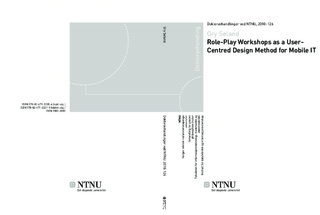| dc.contributor.advisor | Svanæs, | nb_NO |
| dc.contributor.advisor | Nytrø, Øystein | nb_NO |
| dc.contributor.author | Seland, Gry | nb_NO |
| dc.date.accessioned | 2014-12-19T13:36:18Z | |
| dc.date.available | 2014-12-19T13:36:18Z | |
| dc.date.created | 2010-11-23 | nb_NO |
| dc.date.issued | 2010 | nb_NO |
| dc.identifier | 371899 | nb_NO |
| dc.identifier.isbn | 978-82-471-1541-1 | nb_NO |
| dc.identifier.isbn | 978-82-471-1542-8 | nb_NO |
| dc.identifier.uri | http://hdl.handle.net/11250/252258 | |
| dc.description.abstract | This thesis focuses on the different aspects of role-play as an approach for user-centred design of mobile information technology (IT). This is done through development of a sequence of workshops and reflecting on the outcome. The motivation for the thesis has been to develop an understanding of the important conditions for involving end-users in the process of understanding user needs and exploring requirements for mobile IT. The need for new methods to understand mobile IT and the focus on user involvement in the traditions of participatory design and user-centred design established the background for the work. Most of the workshops were carried out in a hospital context.
The overall research approach has been to work iteratively by carrying out a set of smaller studies, so-called workshops. The research design was flexible, characterized by a design that evolves, develops and unfolds, as the research proceeds. The current state of the knowledge on role-play called for a qualitative approach with a focus on understanding important issues concerning user role-plays.
The overall research subject of this thesis is: Develop understanding of key premises for using role-play with low-fidelity prototyping to involve end-users in exploring user needs and requirements for mobile IT.
This research subject was further divided into three specific research questions:
What are the important issues related to planning and running of role-play design workshops with end-users? What do system developers perceive as the strengths and limitations of such role-play workshops as a system development method? What is the role of the workshop facilitators in such role-play workshops?
Five categories of issues of importance for planning and running of role-play workshops with end-users were identified: practicalities, user role-playing, idea generation, workshop resources and roles in the workshop. The system developers regarded the approach as useful for several reasons including enhancing user involvement, helping developers understand the context of use, and creating a focus in a project. The developers also called attentions to limitations of using role-play; such as a narrow user view on the system that does not take system development premises into account. One of the issues that emerged as a particularly important factor in the workshops was the role-play facilitator’s skills in leading the role-play part and the idea generation process. A framework developed by Yardley-Matwiejcsuk proved useful for understanding how to develop and rehearse these kinds of role-play.
The thesis contributes with an understanding of different aspects regarding role-play workshops with end users in the field of Human-Computer Interaction. | nb_NO |
| dc.language | eng | nb_NO |
| dc.publisher | NTNU | nb_NO |
| dc.relation.ispartofseries | Doktoravhandlinger ved NTNU, 1503-8181; 2010:126 | nb_NO |
| dc.subject | Role-play | en_GB |
| dc.subject | user-centred design | en_GB |
| dc.subject | human-computer interaction | en_GB |
| dc.subject | health informatics | en_GB |
| dc.title | Role-Play Workshops as a User-Centred Design Method for Mobile IT | nb_NO |
| dc.type | Doctoral thesis | nb_NO |
| dc.contributor.department | Norges teknisk-naturvitenskapelige universitet, Fakultet for informasjonsteknologi, matematikk og elektroteknikk, Institutt for datateknikk og informasjonsvitenskap | nb_NO |
| dc.description.degree | PhD i informasjons- og kommunikasjonsteknologi | nb_NO |
| dc.description.degree | PhD in Information and Communications Technology | en_GB |

